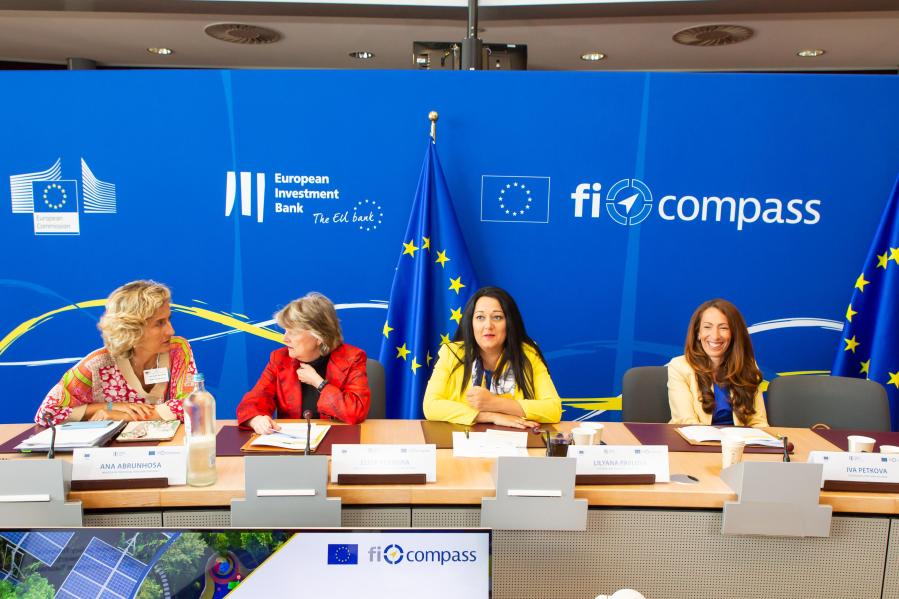
- New models for setting up financial instruments available through fi-compass, an initiative of the European Commission and EIB Advisory Services.
- These new blueprints support the objectives of the REPowerEU and New European Bauhaus initiatives.
- Providing inspiration and replicable options for combining loans with grants, the models will help finance more energy efficiency investments in buildings and promote more sustainable, inclusive and aesthetical territorial development.
At an event in Brussels today, the European Commission Directorate for Regional and Urban policy and the European Investment Bank have launched two new model financial instruments in support of the REPowerEU and New European Bauhaus initiatives. Announced jointly by EU Commissioner for Cohesion and Reforms, Elisa Ferreira and Lilyana Pavlova, EIB Vice-President, the models give options on how to combine EU grants together with loans on favourable terms, to finance investments in support of energy efficiency and territorial development investments.
The models will give authorities who manage EU funds, as well as financial intermediaries such as banks, a practical “how to” guide to easily set up financial instruments, to provide funding and advisory support to investments in energy efficiency and territorial development. They include a menu of options, which provide tangible and practical solutions to common challenges encountered by financial instrument practitioners. Crucially, the models offer a path to leverage the funds available through the EU budget as well as EIB co-financing, to mobilise additional resources from commercial banks and private investors for such schemes.
EIB Vice-President Lilyana Pavlova said, “The EIB is committed to stepping up its support for Europe’s energy sector through its lending, fund management and advisory activities. We believe that this combined package of support can play a crucial role in speeding up the transition to a low-carbon economy. Hopefully, these models can inspire more managing authorities and other stakeholders to make more use of financial instruments, and we will redouble our efforts in ensuring that the necessary financing is available to meet both the EU’s long term goals to reduce carbon emissions, and the immediate needs to bolster our energy resilience.”
The model financial instruments were developed jointly under fi-compass, an advisory mandate managed by the EIB’s Advisory Services and the European Commission. Financial instruments have a long track-record in promoting energy efficiency interventions in both public buildings and private housing around Europe as well as in supporting urban and territorial development. They can help boost investments for building renovation to reduce greenhouse emissions, improve quality of life, and fight energy poverty.
Commissioner for Cohesion and Reforms, Elisa Ferreira, said: “To achieve our climate and energy efficiency targets, we need to mobilize private investments. These new financial instrument models are yet another example of how Cohesion Policy contributes to the European Green Deal. The combination of grants and loans in these models can leverage such investments and encourage deeper renovations and a more sustainable, inclusive and aesthetic territorial development. I invite Member States and Managing Authorities to make use of these models.”
The models provide an incentive for local authorities as they will be backed by a major commitment of Cohesion policy resources by the European Commission, to support the use of financial instruments to meet the objectives of the Green Deal. In combining EU Funds and other public resources with loan financing from the EIB and other financial intermediaries, more financing becomes available for green projects, in line with both the EU’s Green Deal and associated initiatives, and the EIB’s Climate Bank Roadmap.
The two models are available online; one for energy efficiency investments under REPower EU, and one for projects associated with the New European Bauhaus initiative.
For more information, interested parties are invited to contact FI-Compass through Info@fi-compass.eu
Background information:
Through its Advisory Services, the EIB Group makes available its financial and technical expertise to project promoters and local authorities to enhance their institutional capacity, strengthen project preparation and implementation and improve the efficient use of EU funds.
The Directorate-General for Regional and Urban Policy is the European Commission’s department responsible for EU policies on regions and cities. Its mission is to strengthen economic, social and territorial cohesion in line with the headline ambitions of the von der Leyen Commission.
Fi-Compass is a platform for advisory services on financial instruments under the European Shared Management Funds (SMF).fi-compass is provided by the European Commission in partnership with the EIB. It is designed to support SMF managing authorities and other interested parties, by providing practical know-how and learning tools on financial instruments.
REPowerEU is a plan to rapidly reduce dependence on Russian fossil fuels and fast forward the green transition. The fi-compass model financial instrument is designed to promote the use of EU Funds backed loans in combination with grants to finance renovation works to improve energy efficiency in domestic, public and commercial buildings.
The New European Bauhaus (NEB), with the core principles of beautiful, sustainable, together, aims to connect the European Green Deal to EU citizens’ living spaces and experiences. The model financial instrument, which was first mentioned by the Commission in its Communication last year, provides a menu of options for setting up a financial instrument to support urban and territorial investment aligned with NEB principles.
The two initiatives are complementary from a policy perspective as they both aim to support the achievement of the European Green Deal’s objectives. Likewise both models propose the use of loans in combination with grants as a way to mobilise additional resources at the scale required to deliver the EU and Member States ambitions regarding the transition to a green economy.

©EIB
Download original

©EIB
Download original

©EIB
Download original